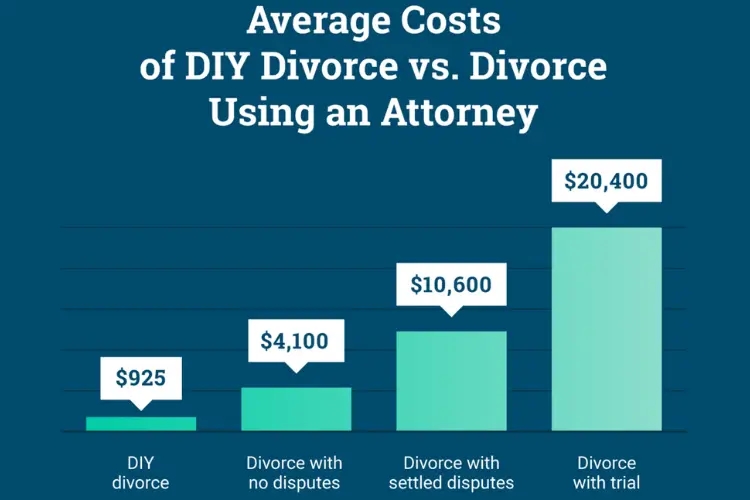“Divorce is always terrible, but I haven’t met anyone who went through it and isn’t happier now.”
Understanding the divorce process
For couples in Indiana who are considering divorce but cannot afford an attorney, this option may seem appealing. While it can save on costs, it is important to fully understand the process and its potential pitfalls.
The first step in an Indiana divorce is to make sure that both parties meet the residency requirements. At least one spouse must have lived in Indiana for six months before filing for divorce. Once this requirement is met, you can begin by obtaining and filling out the necessary forms at your local county clerk’s office or online from reputable sources.
It is important to realize that going through complex legal procedures without professional guidance carries inherent risks. Without the experience of an attorney, people may overlook important details or make mistakes that can have lasting consequences regarding property division, child custody arrangements, or child support orders. It is the parties’ responsibility to ensure that all necessary documents are submitted correctly and within the required timeframe.
In situations where financial constraints do not allow for the hiring of an attorney, individuals should explore other resources available in their community, such as low-cost or free legal services provided by nonprofit organizations or local bar associations. These options can provide assistance in understanding the legal processes and minimizing potential mistakes during the Indiana divorce process on their own.
Benefits of divorce: cost savings and control
Another advantage is the ability to maintain control over decision-making throughout the process. Couples who choose this route can negotiate directly with each other and work together to reach mutually acceptable agreements on issues such as property division, child custody arrangements, and alimony. This approach provides more flexibility and customization than using court orders, which may not fully meet individual preferences or circumstances. The self-represented parties have greater autonomy when it comes to setting time frames and scheduling hearings.
It is important to note that while there are cost-saving and control advantages to self-represented divorce, it remains critical for individuals without legal representation to thoroughly familiarize themselves with the relevant Indiana laws and procedures. Referring to online resources dedicated to Indiana family law or consulting with professionals through low-cost legal aid programs can ensure that individuals make informed decisions.
Potential problems with a DIY divorce
Going through a divorce on your own can place a significant emotional strain on both parties. Divorce is already emotionally difficult, but when people are responsible for all aspects of the legal process themselves, it can add an extra layer of stress and anxiety. This requires the parties to remain objective when making important decisions that affect their future financial stability and personal relationships.
It is important to note that while hiring an Indiana divorce attorney is costly, given the potential complexities and emotional strain involved, individuals should carefully weigh their options. Consulting with attorneys about fees and exploring alternatives, such as low-cost or free legal services, can provide more clarity.
Familiarizing yourself with Indiana’s legal requirements for divorce can be difficult, especially for individuals who cannot afford an attorney. Understanding the specific laws and procedures is important to ensure that all the necessary steps are followed correctly. In Indiana, grounds for divorce include irretrievable separation or conviction of a felony after marriage. The parties representing themselves must accurately complete the required forms, such as the petition for divorce and financial disclosure, and file them with the appropriate county clerk’s office.
Indiana law requires couples with minor children to complete a parenting education program before finalizing their divorce. This program is designed to provide valuable information about co-parenting strategies and resources available to support their children. It is important that the parties familiarize themselves with these requirements and comply accordingly.
While not having a divorce attorney can be difficult, people can still seek advice through online resources designed specifically for Indiana family law or by taking advantage of low-cost or free legal services offered in their community. These resources can help people understand important aspects such as property division, child custody arrangements, and child support orders while ensuring that they are complying with all applicable laws.
The role of lawyers in divorces: expertise and protection of interests
Divorce attorneys play an important role in the process by providing their clients with expertise and support. Knowledge of Indiana divorce laws and procedures can help people navigate the complex legal system with confidence. They understand the intricacies of property division, child custody, spousal support, and other relevant issues specific to family law. They can provide valuable guidance, ensuring that all necessary documents are filed correctly and within the required timeframe.
Attorneys defend the rights and interests of their clients during divorce proceedings. They can negotiate on behalf of their clients during settlement discussions or court hearings. Lawyers have experience in dealing with difficult situations that may arise during a divorce. Having a lawyer by your side provides peace of mind, knowing that someone is fighting for your interests.
This comes with additional costs, but it is crucial to consider the value it brings in terms of legal expertise and representation. Consulting with multiple attorneys to discuss fees and payment options can give people a better understanding of what to expect financially when seeking professional help.
Assessing the financial implications of hiring a lawyer
While there are costs associated with hiring an attorney, there are potential benefits to consider as well. They can provide invaluable guidance throughout the process, ensuring that your rights are protected and helping you resolve complex legal issues such as property division or child custody disputes. They know the state laws and court procedures of Indiana, which can greatly increase your chances of achieving favorable outcomes.
To evaluate whether it is financially feasible for you to hire a divorce attorney, we recommend scheduling consultations with several attorneys to discuss their fees and payment options. Many attorneys offer free initial consultations where they can provide a cost estimate based on their assessment of the unique circumstances of your case. This information will allow you to make an informed decision about whether investing in professional representation is within your budgetary constraints and to prioritize protecting your interests during this difficult time.
A factor to consider is a how much is a divorce in Indiana. While the exact cost may vary depending on individual circumstances, it is very important to have a realistic assessment of your financial situation. Generally speaking, hiring an attorney may be more expensive compared to handling things on your own, but it can potentially save you money in the long run by ensuring that assets are distributed fairly, and your rights are protected.
It is important to consider your emotional state during this difficult time. Divorce can be emotional for all parties. If you feel overwhelmed by the legal process or find it difficult to negotiate without the professional guidance and support of an attorney who has a thorough understanding of Indiana family law, you should consult with an attorney.
It is advisable to consult with several attorneys about their fees and also explore alternative options, such as mediation services, which offer a middle ground between self-representation and full-blown litigation.






